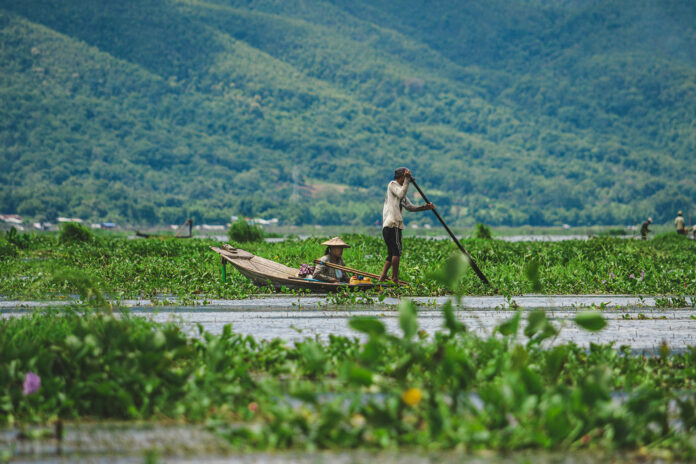
The impact of global warming on the food sector cannot be denied and it is steadily becoming more difficult to deal with as the effects of climate change widen in scope and their negative effects become more challenging to mitigate. The presence of a larger quantity of carbon in the atmosphere and severe warming have caused droughts to become more common and intense, reducing yields.
Livestock are also more vulnerable due to the reduced quality of their food supply, as well as because of the heat stress they have to face. In Ireland, the agriculture sector is also the largest source of greenhouse gas emissions, accounting for more than 30% of the country’s emissions in 2023, so the necessity for developing eco-friendly solutions for the sector remains paramount.
Worsening climate change patterns are making things even more difficult for farmers, who have no choice but to adapt to new practices and develop ways to ensure they don’t lose their income. One of the most serious threats farmers have to deal with is an increasing incidence of pests, as getting rid of them can be an incredibly long and frustrating process, as well as harmful for the crops and the workers, depending on the methods chosen.
Rodents
Rising temperatures are causing pests such as rodents to be active for longer, meaning that they’ll also be searching for food longer. Milder winters allow rats and mice to survive and reproduce at higher rates, so farmers need to deal with a much larger population of rodents targeting their crops. Higher numbers of pests don’t just cause extensive damage to harvests but can even increase the likelihood of bacteria, viruses and other pathogens finding their way into the food supply. Getting help from a professional service such as Pest Watch Dublin is the only way to solve a pesky pest problem that you haven’t been able to deal with on your own.
It can be challenging to get rid of rodents on your own since they’re resilient and smart, as well as very adept at finding good places to hide. If you want to get rid of them for good, you’re much more likely to be successful if you get experts to help. Rodents are single handedly responsible for the destruction of at least 1% of the world’s cereal harvests, as they tend to feed on crop embryos, meaning that germination capabilities are completely eradicated and nutrients are depleted.
Asian hornets
Asian hornets are indigenous to Southeast Asia but have become an invasive species in several other regions around the globe, most prominently in Europe. The primary concern of their introduction in different ecosystems is the fact that they’re opportunistic hunters who prey on honeybees, a behaviour they share with the Japanese giant hornets. In the UK, the range in which Asian hornets live is steadily expanding due to changes in climate patterns, meaning that more bees are threatened. Given their importance as a cornerstone species responsible for pollination, dwindling bee populations are an issue for the health and well-being of virtually all plant species, including crops.
The bees typically don’t have any way to protect themselves from these predators because they never had to worry about or interact with them in the past, meaning that gardeners and beekeepers have to be particularly attentive. On top of the threat to the ecosystem, the sting of the Asian Hornet is particularly painful and can cause severe allergic reactions in susceptible populations. Asian hornets don’t lose their stingers, meaning they can sting victims several times.
Aphids
Aphids are small insects that feed on sap and are not directly dangerous to humans. However, the damage they can cause to crops can be extensive, meaning they indirectly impact human lives by destroying trees, gardens, and farms, especially if left unchecked. They are the most serious pest hazard in Ireland, as they feed on the new grass shoots and spread the barley yellow dwarf disease, which happens to affect important food staples such as oats, wheat, maize, barley, rice, and triticale. March drilled barley is typically less susceptible to acquiring BYDV compared to April drilled barley due to the standard aphid activity patterns, but this is likely to change over the next few years due to global warming and shifting temperatures.
Research has confirmed that some aphids have become resistant to insecticides, so growers need to adopt new methods to keep populations under control. Monitoring the activity of the insects in individual fields offers better results than using general knowledge, and if you discover control is poor in some areas, you should discuss the best solutions for a follow-up treatment with your advisor.
Locusts
Global warming is a leading cause of worsening locust outbreaks all over the world, as erratic weather makes it easier for these insects to reach more expansive areas and do much more damage. Air temperature, precipitation volumes, soil moisture levels, and wind patterns have all been found to intensify these outbreaks. Predicting how the weather will change can be close to impossible since climate change has created a lot of unpredictability when it comes to temperatures, rain and snowfall. However, it can be inferred that since the variability is expected to increase, the number of locusts will grow as well.
People living in emerging economies are particularly vulnerable to these invasions, and they are also starting to become more commonplace in areas where locusts were previously a rather rare occurrence.
The future
The effects of climate change are incredibly complex in their scope, and dealing with them takes no small amount of time, effort and resources. As temperatures rise, the number of pests increases, meaning farmers need more potent pesticides to protect their crops and livestock. Many of them can be hazardous to human health, but many feel like they simply have no choice. Comprehensive solutions are required to ensure that the agriculture sector won’t be caught unprepared by global warming and that it can benefit from policies and solutions that will allow it to thrive.











